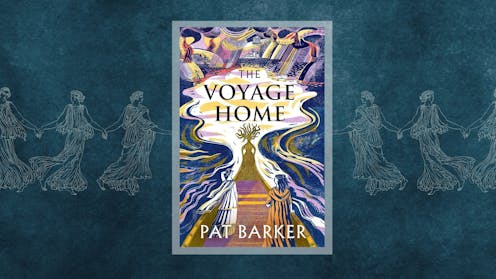
The legend of Troy – a city sparking with fire, a cataclysmic war and a refugee crisis – always has something more to offer writers looking for inspiration. The unspeakable horrors of conflict. The brutalities written on women’s bodies. The journey that, for the victors, means a voyage home, and for the victims, a farewell to freedom.
And it’s very much the season for Troy. Emily Wilson’s landmark Iliad translation was released in paperback on August 6. Stephen Fry’s Odyssey retelling will be published in September. My own book, Mythica – a new history of Homer’s world, told through the real women written out of it – is published next spring.
And now the final novel in Pat Barker’s Trojan War series, The Voyage Home, is here. This three-part voyage began with The Silence of the Girls in 2018, a rewriting of the Iliad that hurled a pointed question against the logic of the glory of war, and the epics that tell it.
Barker’s angle (both in The Silence of the Girls and its 2021 sequel, The Women of Troy, 2021) is to insist, unrelentingly, on the grim, real hideousness of war. The range and scope of the horror is vast: from macroscopic crimes of genocide, enslavement and mass rape that stain the Trojan War, to microscale realities of battle in “shit”, “piss” and (unforgettably) the “goose-fat jar” shared by the raped victims of the Greeks.
The trilogy is a harrowing read, but a necessary one. Each book prises myth and war out of the self-justification of men like Agamemnon and Achilles who refused to see women and enslaved people as worthy. These stories demand, uncompromisingly, a confrontation with the consequences.
Life after war
The Voyage Home moves from the atrocities committed in the ruins of battle to the repercussions those crimes have on the life after, at “home” and asks: what does that even mean, when one man’s home is another woman’s prison?
As in Barker’s other novels, the language is plain to the point of crudeness (there’s plenty of “piss” and “shit”). And, for the most part, it encapsulates the forces at work in this brutal world: “I was Cassandra’s catch-fart,” remarks Ritsa in the opening pages; “well, be honest, would you want that on your headstone?”
The narrative pulses with the inevitability of the Greek tragedies from which Barker draws, towards some sort of retribution by women for the horrors at Troy, acted out against Agamemnon, king of the Greeks. He will take the final, though not complete, punishment for the butchery and rape he led at Troy.
Clytemnestra, Agamemnon’s wife, whose daughter he slaughtered, paces within the haunted walls of Mycenae, planning her husband’s murder. At night she weaves a sleeveless tunic in which she’ll trap him on his return. (No prizes for spotting the parallel to Odysseus’ wife, Penelope.)
Cassandra is loaded up on a boat out of Troy, as the Trojan women are carted back to Greece, moving towards her prophesied fate. And Ritsa, an invention of Barker’s, former friend of Briseis (narrator of The Silence of the Girls, whom it seems Barker misses quite as much as Ritsa does) traipses in Cassandra’s wake. She watches the tragedy unravel, tossing in occasional wry reflections on the powerlessness of women and slaves.
And, through it all, the lurching journey towards Agamemnon’s murder is accompanied by raucous nursery rhymes from the ghosts of children who inhabit the walls of Mycenae’s palace – as well as their hand prints, smattering behind tapestries: “Here comes a candle to light you to bed, here comes a chopper to CHOP OFF YOUR HEAD!”
There are lingering smears here of crimes that cannot be wiped clean. The murder of Clytemnestra’s daughter, Iphigenia, by her own father. The gruesome slaughter (and cannibalism) of Agamemnon’s nephews by his father. The horrific crime of babies tossed from the walls of Troy (on Agamemnon’s orders). All mix together in the voices of the ghost-children to generate a bubbling, fervid chorus that demand retribution, and broaden the crimes of war that Barker redresses from rape and enslavement to violence against children.
In so doing, Barker points a finger at women’s suffering, not only as rape victims, but as mothers. The image of the ghosts of Trojan boys skittering along behind their enslaved mothers on the forced march to captivity is not one I will soon forget.
Barker is too clever to allow her readers too much closure, though. As Ritsa is quick to point out, it wasn’t the Trojan women who got to take their rage and their vengeance out on Agamemnon: “he was killed by a Greek queen avenging an entirely different crime … The best those slave mothers could hope for was survival – and not all of them managed that”.
Only the rich and the powerful get to have their justice – and even then, as Clytemnestra knows, justice will soon turn against her, too. Though Agamemnon’s death goes some way to a satisfyingly bloody repayment for the destruction Barker has catalogued, there is a lingering sense that the children will always demand more. And therein lies the novel’s power: the redress against Agamemnon is both magnificent and insufficient.
As any Greek tragedy would tell you, loss can never truly be repaid. Grief is never over. The Trojan War, and the traumas its women endured, will not be forgotten.

Looking for something good? Cut through the noise with a carefully curated selection of the latest releases, live events and exhibitions, straight to your inbox every fortnight, on Fridays. Sign up here.
Emily Hauser is the author of books published by Penguin Random House, including Mythica: A New History of Homer's World, through the Women Written Out Of It (forthcoming 2025), and is a Senior Lecturer in Classics and Ancient History at the University of Exeter.
This article was originally published on The Conversation. Read the original article.







